|
TinkerCell Core 1.0
TinkerCell's Core library providing all basic functionalities
|
|
TinkerCell Core 1.0
TinkerCell's Core library providing all basic functionalities
|
A class that is used to store a network. The network is a collection of Item Handles. The history stack is also a key component of a network. The network can either be represented as text using TextEditor or visualized with graphical items in the GraphicsScene. Each node and connection are contained in a handle, and each handle can either be represented as text or as graphics. The two main components of NetworkWindow are the SymbolsTable and HistoryStack This class provides functions for inserting items, removing items, and changing information inside the model. More...
#include <NetworkHandle.h>
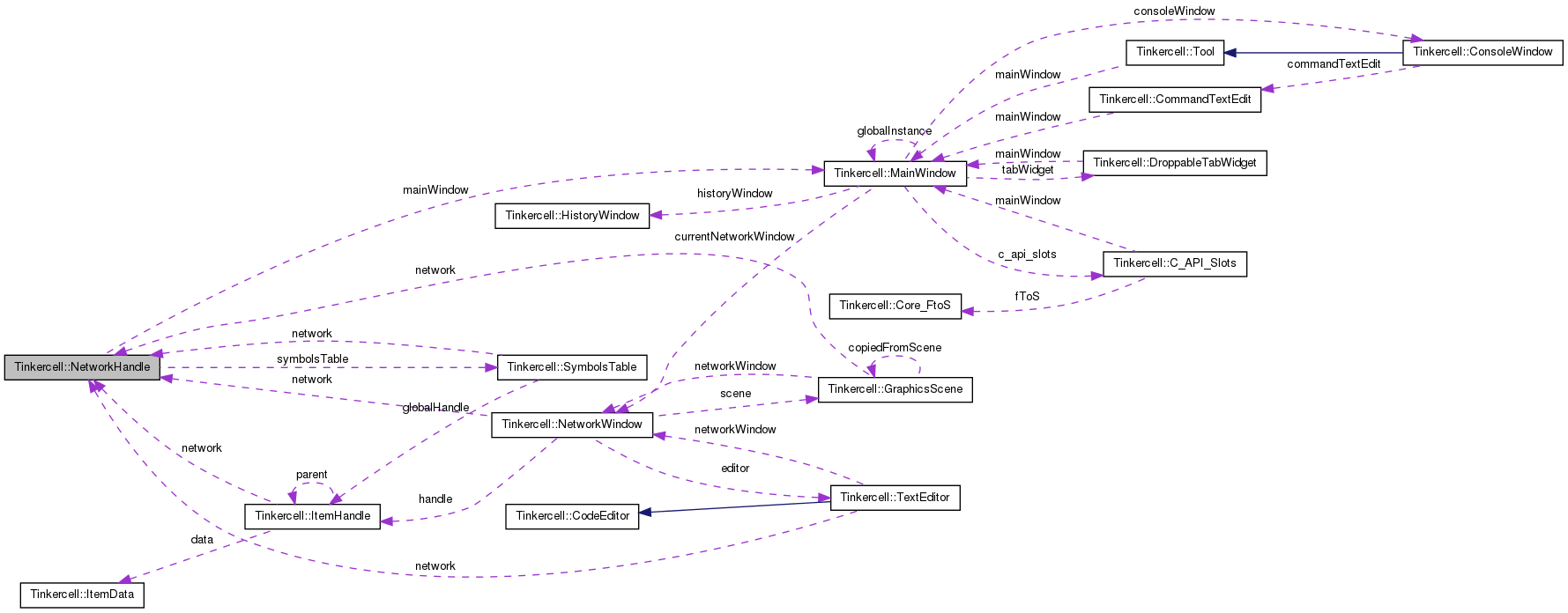
Public Slots | |
slots | |
update the symbols table that stores all the symbols in the network | |
| virtual void | updateSymbolsTable () |
| updates the symbols table | |
| virtual void | updateSymbolsTable (int) |
| updates the symbols table. The int argument is so that this can be connected to the history changed signal | |
| virtual void | close () |
| updates the symbols table. The int argument is so that this can be connected to the history changed signal | |
| virtual void | undo () |
| undo last command | |
| virtual void | redo () |
| redo last command | |
| virtual void | push (QUndoCommand *) |
| push a new command into the history stack | |
Public Member Functions | |
Constructor and destructor | |
| NetworkHandle (MainWindow *) | |
| constructor | |
| virtual | ~NetworkHandle () |
| destructor | |
Get items | |
get the set of items in the model | |
| virtual QList< ItemHandle * > | handles (bool sort=false) const |
| get all the items in this network | |
| virtual QList< ItemHandle * > | handlesSortedByFamily () const |
| get list of all items sorted according to family | |
| virtual ItemHandle * | globalHandle () |
| the model global item | |
| virtual QString | annotations () const |
| all free floating text in the visual diagram | |
| virtual GraphicsScene * | currentScene () const |
| gets the current scene that is active | |
| virtual TextEditor * | currentTextEditor () const |
| gets the text editor that is active | |
| virtual NetworkWindow * | currentWindow () const |
| gets the window that is active | |
| virtual void | showScene (GraphicsScene *) |
| show the window that contains the given scene | |
| virtual void | showTextEditor (TextEditor *) |
| show the window that contains the given text editor | |
| ConsoleWindow * | console () const |
| same as main window's console() | |
find item handles and data tables | |
| QList< ItemHandle * > | findItem (const QString &) const |
| get all the items with the given name. Returns a list for non-unique names | |
| QList< ItemHandle * > | findItem (const QRegExp &) const |
| get all the items with the given name pattern. | |
| QList< ItemHandle * > | findItem (const QStringList &) const |
| get all the items with the given name. returned list may be longer if names are non-unique | |
| QList< QPair< ItemHandle *, QString > > | findData (const QString &) const |
| get all the items and corresponding data table name that contains the given string. if non-unique, returns a list | |
| QList< QPair< ItemHandle *, QString > > | findData (const QStringList &) const |
| get all the items and corresponding data table name that contains the given string. if non-unique, returns a list | |
| QList< QPair< ItemHandle *, QString > > | findData (const QRegExp &) const |
| get all the items and corresponding data table name that contains the given pattern. if non-unique, returns a list | |
create scene or editor | |
| virtual void | remove (const QString &name, const QList< QGraphicsItem * > &items) |
| this command performs a removal and also adds undo command to history window and emits associated signal(s) | |
| virtual void | remove (const QString &name, const QList< ItemHandle * > &items) |
| this command performs a removal and also adds undo command to history window and emits associated signal(s) | |
| virtual QList< GraphicsScene * > | scenes () const |
| get all the graphics scenes used to illustrate this network | |
| virtual QList< TextEditor * > | editors () const |
| get all the text editors used to express this network | |
| virtual GraphicsScene * | createScene (const QList< QGraphicsItem * > &insertItems=QList< QGraphicsItem * >()) |
| create a new scene for this network | |
| virtual GraphicsScene * | createScene (ItemHandle *, const QRectF &boundingRect=QRectF()) |
| create a new scene that gets all the items inside the given item handle. | |
| virtual TextEditor * | createTextEditor (const QString &text=QString()) |
| create a new text editor for this network | |
| virtual void | setWindowTitle (const QString &) |
| set all the title for each window representing this network | |
| virtual QString | windowTitle () const |
| get the title for current window representing this network | |
| virtual bool | parseMath (QString &, QStringList &, QStringList &, QList< ItemHandle * > &) |
| checks whether a string is a correct formula. | |
| virtual QString | makeUnique (const QString &, const QStringList &doNotUseNames=QStringList()) const |
| checks whether the given string names a unique item or data entry | |
| virtual QString | makeUnique (ItemHandle *handle, const QStringList &doNotUseNames=QStringList()) const |
| checks whether the given handle's name is unique and returns a new name. Note that this can be different from makeUnqiue for strings, because this function will check if an existing name belongs to the given handle, in which case no change is needed. | |
| virtual QStringList | makeUnique (const QStringList &, const QStringList &doNotUseNames=QStringList()) const |
| checks whether the given string names a unique item or data entry | |
rename items | |
These functions automatically perform history updates and send appropriate signals, which will inform the other tools that an insertion or deletion has taken place. | |
| virtual QString | rename (const QString &oldname, const QString &new_name) |
| rename item and also adds undo command to history window and emits associated signal(s) | |
| virtual QString | rename (ItemHandle *item, const QString &new_name) |
| rename an item and also adds undo command to history window and emits associated signal(s) | |
| virtual QStringList | rename (const QList< ItemHandle * > &items, const QList< QString > &new_names) |
| rename items and also adds undo command to history window and emits associated signal(s) | |
change parents of items | |
These functions automatically perform history updates and send appropriate signals, which will inform the other tools that an insertion or deletion has taken place. | |
| virtual void | setParentHandle (const QList< ItemHandle * > &handles, const QList< ItemHandle * > &parentHandles) |
| change parent handles and also adds undo command to history window and emits associated signal(s) | |
| virtual void | setParentHandle (ItemHandle *child, ItemHandle *parent) |
| change parent handle and also adds undo command to history window and emits associated signal(s) | |
| virtual void | setParentHandle (const QList< ItemHandle * > children, ItemHandle *parent) |
| change parent for handles and also adds undo command to history window and emits associated signal(s) | |
| virtual void | setHandleFamily (const QList< ItemHandle * > &handles, const QList< ItemFamily * > &newfamilies) |
| change handles families and also adds undo command to history window and emits associated signal(s) | |
| virtual void | setHandleFamily (ItemHandle *handle, ItemFamily *newfamily) |
| change handle and also adds undo command to history window and emits associated signal(s) | |
| virtual void | setHandleFamily (const QList< ItemHandle * > handles, ItemFamily *newfamily) |
| change family for handles and also adds undo command to history window and emits associated signal(s) | |
change data in one or more items | |
These functions automatically perform history updates and send appropriate signals, which will inform the other tools that an insertion or deletion has taken place. | |
| virtual void | changeData (const QString &name, ItemHandle *handle, const QString &hashstring, const NumericalDataTable *newdata) |
| change numerical data table and also adds undo command to history window and emits associated signal(s) | |
| virtual void | changeData (const QString &name, const QList< ItemHandle * > &handles, const QList< QString > &hashstring, const QList< NumericalDataTable * > &newdata) |
| change a list of numerical data tables and also adds undo command to history window and emits associated signal(s) | |
| virtual void | changeData (const QString &name, const QList< ItemHandle * > &handles, const QString &hashstring, const QList< NumericalDataTable * > &newdata) |
| change a list of numerical data tables and also adds undo command to history window and emits associated signal(s) | |
| virtual void | changeData (const QString &name, ItemHandle *handle, const QString &hashstring, const TextDataTable *newdata) |
| change text data table and also adds undo command to history window and emits associated signal(s) | |
| virtual void | changeData (const QString &name, const QList< ItemHandle * > &handles, const QList< QString > &hashstring, const QList< TextDataTable * > &newdata) |
| change a list of text data tables and also adds undo command to history window and emits associated signal(s) | |
| virtual void | changeData (const QString &name, const QList< ItemHandle * > &handles, const QString &hashstring, const QList< TextDataTable * > &newdata) |
| change a list of text data tables and also adds undo command to history window and emits associated signal(s) | |
| virtual void | changeData (const QString &name, ItemHandle *handle, const QString &hashstring, const NumericalDataTable *newdata1, const TextDataTable *newdata2) |
| change two types of data tables and also adds undo command to history window and emits associated signal(s) | |
| virtual void | changeData (const QString &name, const QList< ItemHandle * > &handles, const QList< QString > &hashstring, const QList< NumericalDataTable * > &newdata1, const QList< TextDataTable * > &newdata2) |
| change a list of two types of data tables and also adds undo command to history window and emits associated signal(s) | |
| virtual void | changeData (const QString &name, const QList< ItemHandle * > &handles, const QString &hashstring, const QList< NumericalDataTable * > &newdata1, const QList< TextDataTable * > &newdata2) |
| change a list of two types of data tables and also adds undo command to history window and emits associated signal(s) | |
| virtual void | changeData (const QString &name, const QList< ItemHandle * > &handles, const QList< NumericalDataTable * > &olddata1, const QList< NumericalDataTable * > &newdata1) |
| change a list of two types of data tables and also adds undo command to history window and emits associated signal(s) | |
| virtual void | changeData (const QString &name, const QList< ItemHandle * > &handles, const QList< TextDataTable * > &olddata2, const QList< TextDataTable * > &newdata2) |
| change a list of two types of data tables and also adds undo command to history window and emits associated signal(s) | |
| virtual void | changeData (const QString &name, const QList< ItemHandle * > &handles, const QList< NumericalDataTable * > &olddata1, const QList< NumericalDataTable * > &newdata1, const QList< TextDataTable * > &olddata2, const QList< TextDataTable * > &newdata2) |
| change a list of two types of data tables and also adds undo command to history window and emits associated signal(s) | |
| virtual void | changeData (const QString &name, const QList< ItemHandle * > &handles, NumericalDataTable *olddata1, const NumericalDataTable *newdata1, TextDataTable *olddata2, const TextDataTable *newdata2) |
| change a two types of data tables and also adds undo command to history window and emits associated signal(s) | |
| virtual void | changeData (const QString &name, const QList< ItemHandle * > &handles, NumericalDataTable *olddata1, const NumericalDataTable *newdata1) |
| change a data table and also adds undo command to history window and emits associated signal(s) | |
| virtual void | changeData (const QString &name, const QList< ItemHandle * > &handles, TextDataTable *olddata1, const TextDataTable *newdata1) |
| change a data table and also adds undo command to history window and emits associated signal(s) | |
| virtual void | assignHandles (const QList< QGraphicsItem * > &items, ItemHandle *newHandle) |
| assign the handle for one or more items | |
| virtual void | mergeHandles (const QList< ItemHandle * > &handles) |
| merge the graphics items and children of two or more handles | |
| virtual void | setModelValues (const QStringList &names, const QList< double > &values, int column=0, const QString &defaultDataTable=QString()) |
| assign the values for the given strings. if data table has multiple columns, provide the column number in the argument | |
| virtual void | setModelValues (const QStringList &names, const QStringList &values, int column=0, const QString &defaultDataTable=QString()) |
| assign the values for the given strings. if data table has multiple columns, provide the column number in the argument | |
| virtual void | setModelValues (const NumericalDataTable &newvalues, const QString &defaultDataTable=QString()) |
| assign the values for the given strings. if data table has multiple columns, provide the column number in the argument | |
| virtual void | setModelValues (const TextDataTable &newvalues, const QString &defaultDataTable=QString()) |
| assign the values for the given strings. if data table has multiple columns, provide the column number in the argument | |
Public Attributes | |
| QUndoStack | history |
| the undo stack | |
| SymbolsTable | symbolsTable |
| holds a hash of all items and data in this scene. | |
signals | |
| class | GraphicsView |
| class | GraphicsScene |
| class | TextEditor |
| class | MainWindow |
| class | NetworkWindow |
| class | SymbolsTable |
| void | itemsRenamed (NetworkHandle *network, const QList< ItemHandle * > &items, const QList< QString > &oldnames, const QList< QString > &newnames) |
| signals whenever an item is renamed | |
| void | parentHandleChanged (NetworkHandle *network, const QList< ItemHandle * > &, const QList< ItemHandle * > &) |
| signals whenever item parent handle is changed | |
| void | handleFamilyChanged (NetworkHandle *network, const QList< ItemHandle * > &, const QList< ItemFamily * > &) |
| signals whenever item handles' families are changed | |
| void | dataChanged (const QList< ItemHandle * > &items) |
| signals whenever some data is changed | |
| void | handlesChanged (NetworkHandle *network, const QList< QGraphicsItem * > &items, const QList< ItemHandle * > &old) |
| signals whenever the handles for graphics items have changed | |
| void | historyChanged (int i=0) |
| one of more changed have occurred in the history window of the current scene | |
A class that is used to store a network. The network is a collection of Item Handles. The history stack is also a key component of a network. The network can either be represented as text using TextEditor or visualized with graphical items in the GraphicsScene. Each node and connection are contained in a handle, and each handle can either be represented as text or as graphics. The two main components of NetworkWindow are the SymbolsTable and HistoryStack This class provides functions for inserting items, removing items, and changing information inside the model.
Definition at line 53 of file NetworkHandle.h.
| Tinkercell::NetworkHandle::NetworkHandle | ( | MainWindow * | main | ) |
constructor
Definition at line 309 of file NetworkHandle.cpp.

| Tinkercell::NetworkHandle::~NetworkHandle | ( | ) | [virtual] |
destructor
Definition at line 34 of file NetworkHandle.cpp.

| QString Tinkercell::NetworkHandle::annotations | ( | ) | const [virtual] |
all free floating text in the visual diagram
Definition at line 1202 of file NetworkHandle.cpp.

| void Tinkercell::NetworkHandle::assignHandles | ( | const QList< QGraphicsItem * > & | items, |
| ItemHandle * | newHandle | ||
| ) | [virtual] |
assign the handle for one or more items
Definition at line 952 of file NetworkHandle.cpp.

| void Tinkercell::NetworkHandle::changeData | ( | const QString & | name, |
| ItemHandle * | handle, | ||
| const QString & | hashstring, | ||
| const NumericalDataTable * | newdata | ||
| ) | [virtual] |
change numerical data table and also adds undo command to history window and emits associated signal(s)
change numerical data table
Definition at line 536 of file NetworkHandle.cpp.
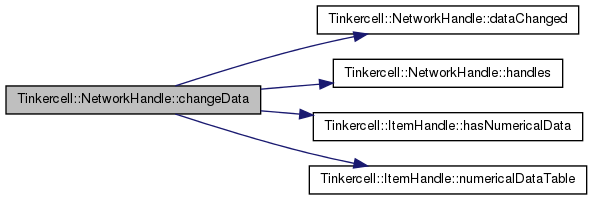

| void Tinkercell::NetworkHandle::changeData | ( | const QString & | name, |
| const QList< ItemHandle * > & | handles, | ||
| const QList< QString > & | hashstring, | ||
| const QList< NumericalDataTable * > & | newdata | ||
| ) | [virtual] |
change a list of numerical data tables and also adds undo command to history window and emits associated signal(s)
change a list of numerical data tables
Definition at line 550 of file NetworkHandle.cpp.

| void Tinkercell::NetworkHandle::changeData | ( | const QString & | name, |
| const QList< ItemHandle * > & | handles, | ||
| const QString & | hashstring, | ||
| const QList< NumericalDataTable * > & | newdata | ||
| ) | [virtual] |
change a list of numerical data tables and also adds undo command to history window and emits associated signal(s)
change a list of numerical data tables
Definition at line 573 of file NetworkHandle.cpp.

| void Tinkercell::NetworkHandle::changeData | ( | const QString & | name, |
| ItemHandle * | handle, | ||
| const QString & | hashstring, | ||
| const TextDataTable * | newdata | ||
| ) | [virtual] |
change text data table and also adds undo command to history window and emits associated signal(s)
change text data table
Definition at line 596 of file NetworkHandle.cpp.
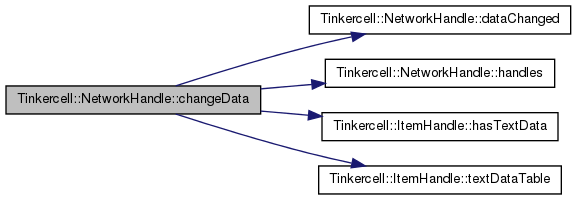
| void Tinkercell::NetworkHandle::changeData | ( | const QString & | name, |
| const QList< ItemHandle * > & | handles, | ||
| const QList< QString > & | hashstring, | ||
| const QList< TextDataTable * > & | newdata | ||
| ) | [virtual] |
change a list of text data tables and also adds undo command to history window and emits associated signal(s)
change a list of text data tables
Definition at line 609 of file NetworkHandle.cpp.

| void Tinkercell::NetworkHandle::changeData | ( | const QString & | name, |
| const QList< ItemHandle * > & | handles, | ||
| const QString & | hashstring, | ||
| const QList< TextDataTable * > & | newdata | ||
| ) | [virtual] |
change a list of text data tables and also adds undo command to history window and emits associated signal(s)
change a list of text data tables
Definition at line 632 of file NetworkHandle.cpp.

| void Tinkercell::NetworkHandle::changeData | ( | const QString & | name, |
| ItemHandle * | handle, | ||
| const QString & | hashstring, | ||
| const NumericalDataTable * | newdata1, | ||
| const TextDataTable * | newdata2 | ||
| ) | [virtual] |
change two types of data tables and also adds undo command to history window and emits associated signal(s)
change two types of data tables
Definition at line 655 of file NetworkHandle.cpp.
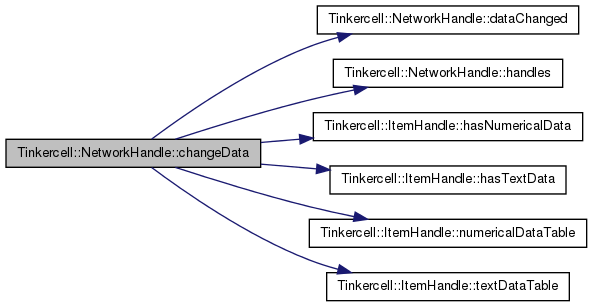
| void Tinkercell::NetworkHandle::changeData | ( | const QString & | name, |
| const QList< ItemHandle * > & | handles, | ||
| const QList< QString > & | hashstring, | ||
| const QList< NumericalDataTable * > & | newdata1, | ||
| const QList< TextDataTable * > & | newdata2 | ||
| ) | [virtual] |
change a list of two types of data tables and also adds undo command to history window and emits associated signal(s)
change a list of two types of data tables
Definition at line 669 of file NetworkHandle.cpp.

| void Tinkercell::NetworkHandle::changeData | ( | const QString & | name, |
| const QList< ItemHandle * > & | handles, | ||
| const QString & | hashstring, | ||
| const QList< NumericalDataTable * > & | newdata1, | ||
| const QList< TextDataTable * > & | newdata2 | ||
| ) | [virtual] |
change a list of two types of data tables and also adds undo command to history window and emits associated signal(s)
change a list of two types of data tables
Definition at line 704 of file NetworkHandle.cpp.

| void Tinkercell::NetworkHandle::changeData | ( | const QString & | name, |
| const QList< ItemHandle * > & | handles, | ||
| const QList< NumericalDataTable * > & | olddata1, | ||
| const QList< NumericalDataTable * > & | newdata1 | ||
| ) | [virtual] |
change a list of two types of data tables and also adds undo command to history window and emits associated signal(s)
Definition at line 753 of file NetworkHandle.cpp.

| void Tinkercell::NetworkHandle::changeData | ( | const QString & | name, |
| const QList< ItemHandle * > & | handles, | ||
| const QList< NumericalDataTable * > & | olddata1, | ||
| const QList< NumericalDataTable * > & | newdata1, | ||
| const QList< TextDataTable * > & | olddata2, | ||
| const QList< TextDataTable * > & | newdata2 | ||
| ) | [virtual] |
change a list of two types of data tables and also adds undo command to history window and emits associated signal(s)
Definition at line 740 of file NetworkHandle.cpp.

| void Tinkercell::NetworkHandle::changeData | ( | const QString & | name, |
| const QList< ItemHandle * > & | handles, | ||
| NumericalDataTable * | olddata1, | ||
| const NumericalDataTable * | newdata1, | ||
| TextDataTable * | olddata2, | ||
| const TextDataTable * | newdata2 | ||
| ) | [virtual] |
change a two types of data tables and also adds undo command to history window and emits associated signal(s)
Definition at line 777 of file NetworkHandle.cpp.

| void Tinkercell::NetworkHandle::changeData | ( | const QString & | name, |
| const QList< ItemHandle * > & | handles, | ||
| const QList< TextDataTable * > & | olddata2, | ||
| const QList< TextDataTable * > & | newdata2 | ||
| ) | [virtual] |
change a list of two types of data tables and also adds undo command to history window and emits associated signal(s)
Definition at line 765 of file NetworkHandle.cpp.

| void Tinkercell::NetworkHandle::changeData | ( | const QString & | name, |
| const QList< ItemHandle * > & | handles, | ||
| TextDataTable * | olddata1, | ||
| const TextDataTable * | newdata1 | ||
| ) | [virtual] |
change a data table and also adds undo command to history window and emits associated signal(s)
Definition at line 802 of file NetworkHandle.cpp.

| void Tinkercell::NetworkHandle::changeData | ( | const QString & | name, |
| const QList< ItemHandle * > & | handles, | ||
| NumericalDataTable * | olddata1, | ||
| const NumericalDataTable * | newdata1 | ||
| ) | [virtual] |
change a data table and also adds undo command to history window and emits associated signal(s)
Definition at line 790 of file NetworkHandle.cpp.

| void Tinkercell::NetworkHandle::close | ( | ) | [virtual, slot] |
updates the symbols table. The int argument is so that this can be connected to the history changed signal
Definition at line 169 of file NetworkHandle.cpp.

| ConsoleWindow * Tinkercell::NetworkHandle::console | ( | ) | const |
same as main window's console()
Definition at line 1074 of file NetworkHandle.cpp.

| GraphicsScene * Tinkercell::NetworkHandle::createScene | ( | const QList< QGraphicsItem * > & | insertItems = QList<QGraphicsItem*>() | ) | [virtual] |
create a new scene for this network
| QList<QGraphicsItem*> | items to initialize the network with |
Definition at line 268 of file NetworkHandle.cpp.


| GraphicsScene * Tinkercell::NetworkHandle::createScene | ( | ItemHandle * | item, |
| const QRectF & | boundingRect = QRectF() |
||
| ) | [virtual] |
create a new scene that gets all the items inside the given item handle.
| ItemHandle | * |
| QRectF | only include the graphicss items |
Definition at line 284 of file NetworkHandle.cpp.

| TextEditor * Tinkercell::NetworkHandle::createTextEditor | ( | const QString & | text = QString() | ) | [virtual] |
create a new text editor for this network
| QString | (optional) initial script |
Definition at line 256 of file NetworkHandle.cpp.

| GraphicsScene * Tinkercell::NetworkHandle::currentScene | ( | ) | const [virtual] |
gets the current scene that is active
Definition at line 358 of file NetworkHandle.cpp.
| TextEditor * Tinkercell::NetworkHandle::currentTextEditor | ( | ) | const [virtual] |
gets the text editor that is active
Definition at line 374 of file NetworkHandle.cpp.
| NetworkWindow * Tinkercell::NetworkHandle::currentWindow | ( | ) | const [virtual] |
gets the window that is active
Definition at line 366 of file NetworkHandle.cpp.
| void Tinkercell::NetworkHandle::dataChanged | ( | const QList< ItemHandle * > & | items | ) | [signal] |
signals whenever some data is changed
| QList<ItemHandle*>& | items handles |

| QList< TextEditor * > Tinkercell::NetworkHandle::editors | ( | ) | const [virtual] |
get all the text editors used to express this network
Definition at line 204 of file NetworkHandle.cpp.

| QList< QPair< ItemHandle *, QString > > Tinkercell::NetworkHandle::findData | ( | const QRegExp & | re | ) | const |
get all the items and corresponding data table name that contains the given pattern. if non-unique, returns a list
| QString |
Definition at line 117 of file NetworkHandle.cpp.
| QList< QPair< ItemHandle *, QString > > Tinkercell::NetworkHandle::findData | ( | const QString & | s | ) | const |
get all the items and corresponding data table name that contains the given string. if non-unique, returns a list
| QString |
Definition at line 102 of file NetworkHandle.cpp.
| QList< QPair< ItemHandle *, QString > > Tinkercell::NetworkHandle::findData | ( | const QStringList & | list | ) | const |
get all the items and corresponding data table name that contains the given string. if non-unique, returns a list
| QString |
Definition at line 139 of file NetworkHandle.cpp.
| QList< ItemHandle * > Tinkercell::NetworkHandle::findItem | ( | const QString & | s | ) | const |
get all the items with the given name. Returns a list for non-unique names
| QString |
Definition at line 49 of file NetworkHandle.cpp.
| QList< ItemHandle * > Tinkercell::NetworkHandle::findItem | ( | const QRegExp & | re | ) | const |
get all the items with the given name pattern.
| QString |
Definition at line 65 of file NetworkHandle.cpp.

| QList< ItemHandle * > Tinkercell::NetworkHandle::findItem | ( | const QStringList & | list | ) | const |
get all the items with the given name. returned list may be longer if names are non-unique
| QStringList |
Definition at line 76 of file NetworkHandle.cpp.
| ItemHandle * Tinkercell::NetworkHandle::globalHandle | ( | ) | [virtual] |
the model global item
Definition at line 330 of file NetworkHandle.cpp.

| void Tinkercell::NetworkHandle::handleFamilyChanged | ( | NetworkHandle * | network, |
| const QList< ItemHandle * > & | , | ||
| const QList< ItemFamily * > & | |||
| ) | [signal] |
signals whenever item handles' families are changed
| NetworkHandle* | network where the event took place |
| QList<ItemHandle*>& | child items |
| QList<ItemFamily*>& | old families |

| QList< ItemHandle * > Tinkercell::NetworkHandle::handles | ( | bool | sort = false | ) | const [virtual] |
get all the items in this network
| bool | sort handles by full name (default = false) |
Definition at line 335 of file NetworkHandle.cpp.
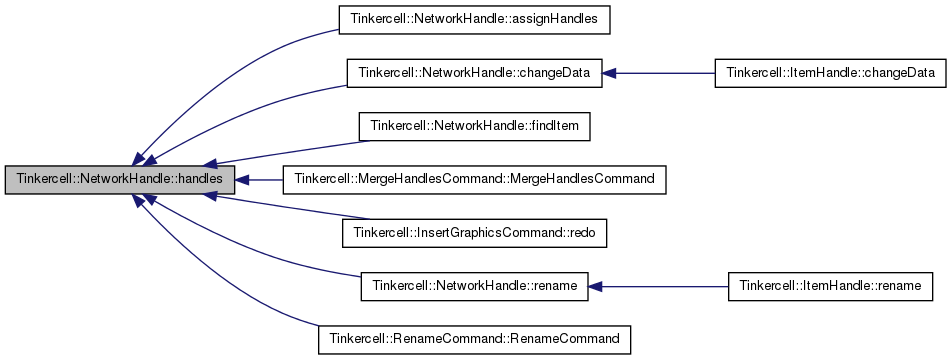
| void Tinkercell::NetworkHandle::handlesChanged | ( | NetworkHandle * | network, |
| const QList< QGraphicsItem * > & | items, | ||
| const QList< ItemHandle * > & | old | ||
| ) | [signal] |
signals whenever the handles for graphics items have changed
| NetworkHandle* | network where the event took place |
| QList<GraphicsItem*>& | items that are affected |
| QList<ItemHandle*>& | old handle for each items |

| QList< ItemHandle * > Tinkercell::NetworkHandle::handlesSortedByFamily | ( | ) | const [virtual] |
get list of all items sorted according to family
Definition at line 353 of file NetworkHandle.cpp.

| void Tinkercell::NetworkHandle::historyChanged | ( | int | i = 0 | ) | [signal] |
one of more changed have occurred in the history window of the current scene
| int | number of changes (negative = undos, positive = redos) |

| void Tinkercell::NetworkHandle::itemsRenamed | ( | NetworkHandle * | network, |
| const QList< ItemHandle * > & | items, | ||
| const QList< QString > & | oldnames, | ||
| const QList< QString > & | newnames | ||
| ) | [signal] |
signals whenever an item is renamed
| NetworkHandle* | network where the event took place |
| QList<ItemHandle*>& | items |
| QList<QString>& | old names |
| QList<QString>& | new names |

| QString Tinkercell::NetworkHandle::makeUnique | ( | const QString & | str, |
| const QStringList & | doNotUseNames = QStringList() |
||
| ) | const [virtual] |
checks whether the given string names a unique item or data entry
| QString | target string |
| QStringList | any other names that should be disallowed (optional) |
Definition at line 1081 of file NetworkHandle.cpp.

| QString Tinkercell::NetworkHandle::makeUnique | ( | ItemHandle * | handle, |
| const QStringList & | doNotUseNames = QStringList() |
||
| ) | const [virtual] |
checks whether the given handle's name is unique and returns a new name. Note that this can be different from makeUnqiue for strings, because this function will check if an existing name belongs to the given handle, in which case no change is needed.
| ItemHandle | * handle |
| QStringList | any other names that should be disallowed (optional) |
Definition at line 1158 of file NetworkHandle.cpp.

| QStringList Tinkercell::NetworkHandle::makeUnique | ( | const QStringList & | oldnames, |
| const QStringList & | doNotUseNames = QStringList() |
||
| ) | const [virtual] |
checks whether the given string names a unique item or data entry
| QStringList | target strings |
Definition at line 1114 of file NetworkHandle.cpp.
| void Tinkercell::NetworkHandle::mergeHandles | ( | const QList< ItemHandle * > & | handles | ) | [virtual] |
merge the graphics items and children of two or more handles
Definition at line 966 of file NetworkHandle.cpp.

| void Tinkercell::NetworkHandle::parentHandleChanged | ( | NetworkHandle * | network, |
| const QList< ItemHandle * > & | , | ||
| const QList< ItemHandle * > & | |||
| ) | [signal] |
signals whenever item parent handle is changed
| NetworkHandle* | network where the event took place |
| QList<ItemHandle*>& | child items |
| QList<ItemHandle*>& | old parents |

| bool Tinkercell::NetworkHandle::parseMath | ( | QString & | s, |
| QStringList & | newvars, | ||
| QStringList & | existingVars, | ||
| QList< ItemHandle * > & | usedHandles | ||
| ) | [virtual] |
checks whether a string is a correct formula.
| QString | target string (also the output) |
| QStringList | returns any new variables not found in this network |
| QStringList | returns any network variables found in this network |
| QList<ItemHandle*> | returns any handles used in this equation |
Definition at line 831 of file NetworkHandle.cpp.

| void Tinkercell::NetworkHandle::push | ( | QUndoCommand * | cmd | ) | [virtual, slot] |
push a new command into the history stack
Definition at line 998 of file NetworkHandle.cpp.

| void Tinkercell::NetworkHandle::redo | ( | ) | [virtual, slot] |
redo last command
Definition at line 993 of file NetworkHandle.cpp.

| void Tinkercell::NetworkHandle::remove | ( | const QString & | name, |
| const QList< ItemHandle * > & | items | ||
| ) | [virtual] |
this command performs a removal and also adds undo command to history window and emits associated signal(s)
Definition at line 1040 of file NetworkHandle.cpp.

| void Tinkercell::NetworkHandle::remove | ( | const QString & | name, |
| const QList< QGraphicsItem * > & | items | ||
| ) | [virtual] |
this command performs a removal and also adds undo command to history window and emits associated signal(s)
Definition at line 1017 of file NetworkHandle.cpp.

| QString Tinkercell::NetworkHandle::rename | ( | ItemHandle * | item, |
| const QString & | new_name | ||
| ) | [virtual] |
rename an item and also adds undo command to history window and emits associated signal(s)
Definition at line 422 of file NetworkHandle.cpp.
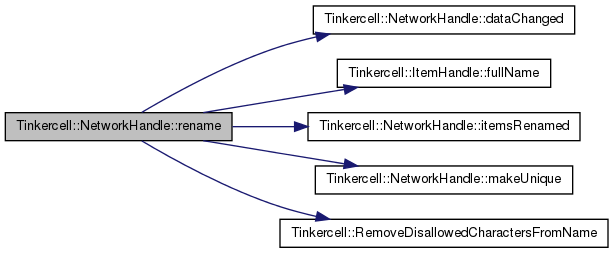
| QStringList Tinkercell::NetworkHandle::rename | ( | const QList< ItemHandle * > & | items, |
| const QList< QString > & | new_names | ||
| ) | [virtual] |
rename items and also adds undo command to history window and emits associated signal(s)
Definition at line 452 of file NetworkHandle.cpp.
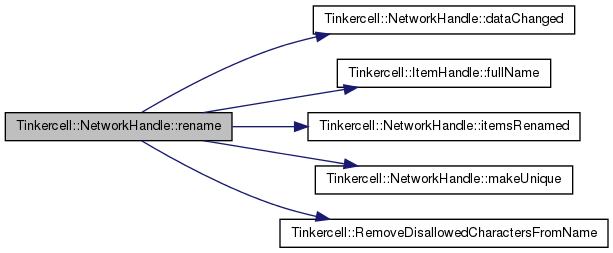
| QString Tinkercell::NetworkHandle::rename | ( | const QString & | oldname, |
| const QString & | new_name | ||
| ) | [virtual] |
rename item and also adds undo command to history window and emits associated signal(s)
Definition at line 382 of file NetworkHandle.cpp.
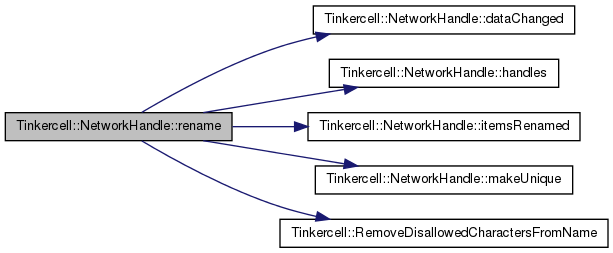

| QList< GraphicsScene * > Tinkercell::NetworkHandle::scenes | ( | ) | const [virtual] |
get all the graphics scenes used to illustrate this network
Definition at line 195 of file NetworkHandle.cpp.

| void Tinkercell::NetworkHandle::setHandleFamily | ( | const QList< ItemHandle * > | handles, |
| ItemFamily * | newfamily | ||
| ) | [virtual] |
change family for handles and also adds undo command to history window and emits associated signal(s)
Definition at line 527 of file NetworkHandle.cpp.

| void Tinkercell::NetworkHandle::setHandleFamily | ( | const QList< ItemHandle * > & | handles, |
| const QList< ItemFamily * > & | newfamilies | ||
| ) | [virtual] |
change handles families and also adds undo command to history window and emits associated signal(s)
Definition at line 512 of file NetworkHandle.cpp.


| void Tinkercell::NetworkHandle::setHandleFamily | ( | ItemHandle * | handle, |
| ItemFamily * | newfamily | ||
| ) | [virtual] |
change handle and also adds undo command to history window and emits associated signal(s)
Definition at line 522 of file NetworkHandle.cpp.

| void Tinkercell::NetworkHandle::setModelValues | ( | const QStringList & | names, |
| const QList< double > & | values, | ||
| int | column = 0, |
||
| const QString & | defaultDataTable = QString() |
||
| ) | [virtual] |
assign the values for the given strings. if data table has multiple columns, provide the column number in the argument
| QStringList | names of variables |
| QList<double> | values |
| int | column number (default=0) |
Definition at line 1217 of file NetworkHandle.cpp.


| void Tinkercell::NetworkHandle::setModelValues | ( | const NumericalDataTable & | newvalues, |
| const QString & | defaultDataTable = QString() |
||
| ) | [virtual] |
assign the values for the given strings. if data table has multiple columns, provide the column number in the argument
| NumericalDataTable | names (rows) and values |
| int | column number (default=0) |
Definition at line 1241 of file NetworkHandle.cpp.
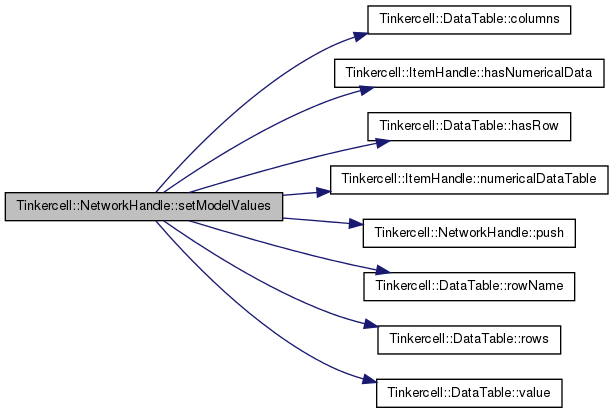
| void Tinkercell::NetworkHandle::setModelValues | ( | const TextDataTable & | newvalues, |
| const QString & | defaultDataTable = QString() |
||
| ) | [virtual] |
assign the values for the given strings. if data table has multiple columns, provide the column number in the argument
| NumericalDataTable | names (rows) and values |
| int | column number (default=0) |
Definition at line 1337 of file NetworkHandle.cpp.
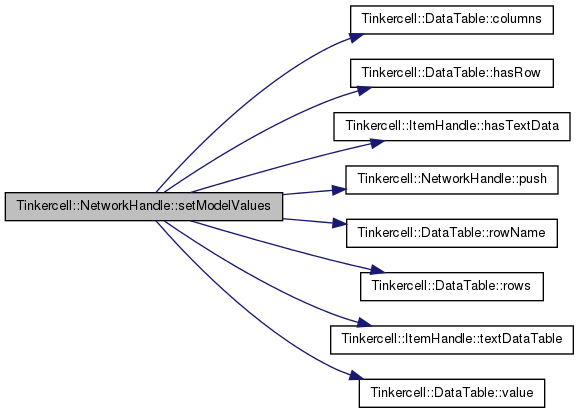
| void Tinkercell::NetworkHandle::setModelValues | ( | const QStringList & | names, |
| const QStringList & | values, | ||
| int | column = 0, |
||
| const QString & | defaultDataTable = QString() |
||
| ) | [virtual] |
assign the values for the given strings. if data table has multiple columns, provide the column number in the argument
| QStringList | names of variables |
| QStringList | values |
| int | column number (default=0) |
Definition at line 1229 of file NetworkHandle.cpp.

| void Tinkercell::NetworkHandle::setParentHandle | ( | ItemHandle * | child, |
| ItemHandle * | parent | ||
| ) | [virtual] |
change parent handle and also adds undo command to history window and emits associated signal(s)
Definition at line 496 of file NetworkHandle.cpp.

| void Tinkercell::NetworkHandle::setParentHandle | ( | const QList< ItemHandle * > & | handles, |
| const QList< ItemHandle * > & | parentHandles | ||
| ) | [virtual] |
change parent handles and also adds undo command to history window and emits associated signal(s)
Definition at line 485 of file NetworkHandle.cpp.


| void Tinkercell::NetworkHandle::setParentHandle | ( | const QList< ItemHandle * > | children, |
| ItemHandle * | parent | ||
| ) | [virtual] |
change parent for handles and also adds undo command to history window and emits associated signal(s)
Definition at line 504 of file NetworkHandle.cpp.

| void Tinkercell::NetworkHandle::setWindowTitle | ( | const QString & | title | ) | [virtual] |
set all the title for each window representing this network
| QString |
Definition at line 188 of file NetworkHandle.cpp.
| void Tinkercell::NetworkHandle::showScene | ( | GraphicsScene * | scene | ) | [virtual] |
show the window that contains the given scene
Definition at line 213 of file NetworkHandle.cpp.

| void Tinkercell::NetworkHandle::showTextEditor | ( | TextEditor * | editor | ) | [virtual] |
show the window that contains the given text editor
Definition at line 236 of file NetworkHandle.cpp.


| void Tinkercell::NetworkHandle::undo | ( | ) | [virtual, slot] |
undo last command
Definition at line 988 of file NetworkHandle.cpp.

| void Tinkercell::NetworkHandle::updateSymbolsTable | ( | int | i | ) | [virtual, slot] |
updates the symbols table. The int argument is so that this can be connected to the history changed signal
update symbols table
Definition at line 820 of file NetworkHandle.cpp.

| void Tinkercell::NetworkHandle::updateSymbolsTable | ( | ) | [virtual, slot] |
updates the symbols table
update symbols table
Definition at line 814 of file NetworkHandle.cpp.


| QString Tinkercell::NetworkHandle::windowTitle | ( | ) | const [virtual] |
get the title for current window representing this network
Definition at line 1004 of file NetworkHandle.cpp.
friend class GraphicsScene [friend] |
Definition at line 392 of file NetworkHandle.h.
friend class GraphicsView [friend] |
Definition at line 391 of file NetworkHandle.h.
friend class MainWindow [friend] |
Definition at line 394 of file NetworkHandle.h.
friend class NetworkWindow [friend] |
Definition at line 395 of file NetworkHandle.h.
friend class SymbolsTable [friend] |
Definition at line 396 of file NetworkHandle.h.
friend class TextEditor [friend] |
Definition at line 393 of file NetworkHandle.h.
| QUndoStack Tinkercell::NetworkHandle::history |
the undo stack
Definition at line 65 of file NetworkHandle.h.
holds a hash of all items and data in this scene.
Definition at line 68 of file NetworkHandle.h.
 1.7.4
1.7.4